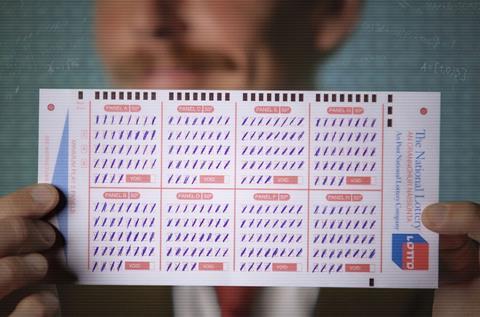Led by a mathemattician, a numbers syndicate attempts to game the Irish Lottery in 1992

Dir. Ross Whitaker. Republic of Ireland. 2025. 80mins
Gambling, the horses, smoke-filled pubs and ‘the craic’ go hand-in-hand in Ross Whitaker’s highly entertaining doc Beat The Lotto, which plays a deft hand in recalling an incident back in 1992 when a syndicate of rosy-faced gents led by a bankrupt stamp dealer took on the Irish Lottery, and…
A ripping yarn from a director who’s good at telling them
To give more away would be a betrayal of how Whitaker (Katie, 2018) expertly layers his story, and one of the more amusing things about this film is you’re not sure how much it matters in the end. Taking place in a extremely analogue era, Beat The Lotto opens the doors on the professional gambling community on the Emerald Isle, canny geezers North and South who like to size up the odds and take a punt if the going seems fair.
Low-fi archival footage with talking heads for context piece together a homemade attempt to put 1.9m Lotto cards through machines in newsagents across the country in the space of a few days. That they were stored in Tayto boxes and delivered by teenagers makes it all the more fun, and parts of Whitaker’s film unexpectedly play out like some sort of rural Oceans 11. As almost everyone says at one point or another: ‘The craic!”
It’s quite unusual for a film about gambling not to include a thunderous sermon against it, or for the players themselves to be so forthright, but Whitaker tackles his subject in a sporting manner. Nicely pitched for a dramatic remake, Beat The Lotto is a ripping yarn from a director who’s good at telling them.
The setting here is the Republic of Ireland in the 1980s and 1990s, a depressed and poor country unwittingly about to enter the Celtic Tiger era. Into these dark days of recession, unemployment (at a staggering 50 percent) and mass emigration came the Lotto, promising dreams-come-true for a £1 bet every week (this was pre-Euro). It was a sophisticated lottery, as lotteries go, with profits being awarded to charity: in short, win-win all round. Press coverage was effusive.
All this caught the eye of mathematician and philatelist Stefan Klincewicz, a slight Corkman of Polish heritage. In the wake of the wild popularity of the weekly sweepstake, he wrote a book called ‘Win The Lotto’ (subtitle: ‘Systems to help you’). He had to admit on live TV that his systems hadn’t helped him to win anything but, behind the scenes, Klincewicz was running the numbers. And when the Lotto started a ‘match four numbers, win £100’ promo, these started to look good. Combine that with a rollover, and Klincewicz thought he’d figured out a way to game the Lotto.
Whitaker doesn’t reveal much about how Klincewicz assembled his 100-member syndicate, a self-described ‘crowd of reprobates’. Figuring it all out isn’t hard, though, especially when one fellow recounts how he met Klincewicz at a race track and they went on to win a ‘three-bedroom duplex, a two-bedroomed apartment and three cars’ together. “It’s all about the game.”
Whitaker deftly deploys archive footage to set the scene. A tired nation, A ray of hope. The wholesome, media-friendly accordion-playing head of the National Lottery, Ray Bates. Then, in opposition, the gamblers and the numbers men of the syndicate who came up with the £975k needed to game the Lotto. The fact that some of this was in bank drafts, scuppered after the banks closed at 3pm on a Friday, really takes you back. Either way, their attempts became public and, in an Ireland beaten down by ‘the system’, it wasn’t easy to figure out who the good guys were.
In a way, this follows the Irish doc nostalgia wave of last year’s Housewife of the Year, but, while that was of domestic appeal, Beat The Lotto has wider potential. Everyone likes a flutter, after all.
Production companies: True Films Presents
International sales: MetFilm Sales, assistant@metfilmstudio.com
Producers: Aideen O’Sullivan, Ross Whitaker
Cinematography: Alex Sapienza
Editing: Nathan Nugent
Music: Michael Fleming
























